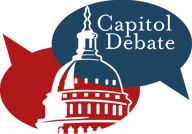|
We teach students the characteristics of a strong speaker, such as confidence, passion, and effective use of body language and eye contact. By learning these skills and techniques, students will be able to communicate more effectively and confidently in any setting. Additionally, by eliminating filler words like "um" and "like," students will be able to speak more clearly and persuasively, enhancing their ability to influence and persuade others. By mastering these techniques, students will become stronger and more effective speakers, capable of captivating and engaging any audience.
|
|
We teach students various communication skills, including vocal variety, articulation, pronunciation, voice projection, intonation, body language, and eye contact. These skills help students become better communicators, able to convey their message clearly and effectively to any audience.
|
|
We teach students how to use rhetorical questions and stunning statistics to grab their audience's attention and make a powerful impact. These techniques can be especially effective at the beginning of a speech, as they can engage the audience's curiosity and emotions and set the stage for a compelling and persuasive presentation. We also teach students the importance of stating their thesis or main argument clearly and early on in the speech. This helps to focus the audience's attention and gives them a clear understanding of the direction that the speech will take. By stating their thesis clearly and persuasively, students can set the stage for a strong and compelling case that leaves a lasting impression on their audience.
|
|
Organizing a speech into main points and using examples, supporting materials, and evidence can help our students create a clear and logical structure and strengthen their argument, making their ideas more convincing and persuasive to the audience. This can lead to a more effective and memorable speech.
|
|
Learning how to research effectively is an important skill for success in public speaking and debate. It allows students to increase their knowledge and understanding of a topic, find reliable and persuasive evidence to support their arguments, and improve critical thinking skills. These skills also have practical applications as they can enhance confidence and prepare students for personal and professional challenges. By learning how to research effectively, your child will gain confidence in their own abilities and feel more prepared for any challenge that comes their way.
|
|
Learning how to write a winning debate case is an important skill for any student. It allows them to synthesize their arguments into a compelling case that is clear, logical, and persuasive. By organizing their thoughts and ideas into a structured and well-supported case, students can more effectively communicate their position and persuade their audience. Writing a winning debate case requires students to carefully select and order their best arguments into a logical and persuasive case. This process can help students to become more analytical and discerning in their thinking, skills that are valuable not only in debates, but in all areas of life.
|
|
Learning the power of cross examination can give students a significant advantage in their debates. Cross examination is a critical component of any debate, as it allows debaters to test the credibility and reliability of their opponent's arguments. By effectively conducting cross examination, debaters can expose weaknesses in their opponent's case and strengthen their own argument. Understanding the power of effective cross-examination, will provide students the upper hand in all areas of life including arguing a point with a friend or negotiating a deal in the professional world.
|
|
Learning how to effectively refute arguments is an essential skill for any debater. At Capitol Debate, students have the opportunity to learn and practice this crucial skill in a supportive and structured environment. By learning how to identify weaknesses in their opponents' arguments and effectively counter them, students can strengthen their own arguments and increase their chances of winning debates.
|
|
Giving a memorable and persuasive closing speech is an essential skill for any debater. It is the final opportunity to leave a lasting impression on the judges and to convince them that your argument is the strongest. At Capitol Debate, students have the opportunity to learn and practice the techniques of giving a powerful closing speech from the top debate instructors in the country. By learning how to effectively summarize their arguments and leave a lasting impact on the audience, students can increase their chances of winning debates and become more confident and persuasive speakers. In addition, learning how to give a memorable closing speech can help students develop their public speaking skills and the ability to think on their feet. Overall, mastering the art of the closing speech is an important step on the path to becoming a successful debater and an effective communicator.
|
|
Learning how to think on your feet is an essential skill for success in debate and in life. In debate, being able to quickly and effectively respond to unexpected arguments and challenges is crucial to winning. At Capitol Debate students have the opportunity to learn and practice this important skill. This skill can also be valuable in everyday life, as it allows individuals to think on their feet in a variety of situations and to adapt to new challenges and changes quickly. Whether it's giving a presentation at school, participating in a job interview, or simply engaging in casual conversation, the ability to think on your feet can help students succeed in any situation. Overall, learning how to think on your feet is an important step on the path to becoming a confident and effective communicator.
|
